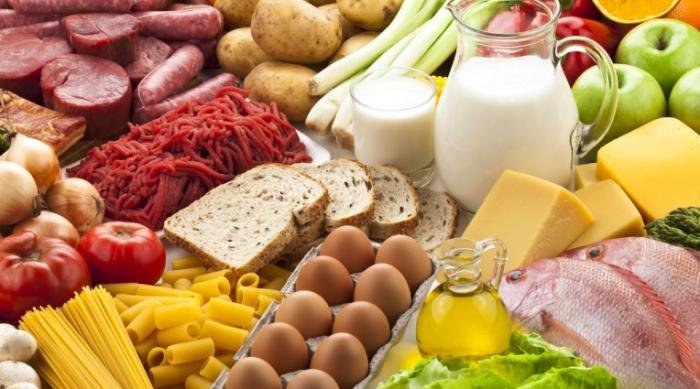Maintaining a healthy diet is essential to provide our body with the necessary daily nutrients. We discover which the essentials are and what functions they have.

The essential nutrients are those that our body cannot synthesize but instead are necessary for the body to function well.
The essential nutrients, therefore we must look for it in the food so that later the organism fulfills the function of first breaking them down and then assimilating them.
These nutrients are necessary as we have said before for our body to function well, to obtain energy, to form tissues, to repair damaged tissues, and other biochemical processes that our body performs.
What are the essential nutrients?
Proteins, carbohydrates, saturated, unsaturated and Trans fats, water-soluble and low-soluble vitamins, minerals, macromineral and trace elements, and water.
Protein
They are essential for growth, for the formation of tissues, their synthesis and maintenance, for the formation of hemoglobin, hormones including insulin, for the maintenance of vitamins, help transport oxygen and carbon dioxide to through the blood.
Proteins are found in foods such as meat, poultry, fish, eggs, milk, products derived from milk, legumes, vegetables, greens, cereals.
Although proteins are essential, as we have said before, an excess of them can also be harmful to the body, as well as its lack.
Carbohydrates
They are the main source of energy for our body, since our cells are nourished by them, mainly the brain.
They are divided into several groups, depending on how many components are present in the formation of hydrates: monosaccharides, disaccharides, polysaccharides.
In the group of the monosaccharides have the following foods: honey, glucose and fruits, some vegetables too. In the group of disaccharides: lactose (milk), sugar or sucrose, maltose.
In the group of polysaccharides: vegetables, vegetables, cereals, legumes, nuts, oranges, apples.
When it comes to consuming carbohydrates or carbohydrates, it is better to opt for slow absorption ones such as whole grains, legumes and vegetables or vegetables.
Fats
Also called lipids, they fulfill the following functions in our body such as maintaining body temperature, transporting vitamins and synthesizing them, synthesizing hormones, they are present in cell membranes, they act as an energy reserve.
Saturated fats: come from animals, meat, sausages, milk, dairy products, industrial pastries, butter, and mayonnaise.
The consumption of saturated fats is advisable to reduce it, since its consumption in excess is detrimental to our health.
Unsaturated fats: we find them in vegetables, nuts, avocado, fish, olive oil, olives, sunflower oil, white fish, blue fish, cereals, whole grains, sesame seeds, flax seeds.
Tran’s fats: they are the most dangerous for our health, they are unsaturated fats which undergo a transformation process (hydrogenation) to convert them into saturated fats and are present in margarines, industrial pastries, cookies, potato chips, other salty snacks, junk food or fast food, industrially prepared soups and sauces, precooked foods, frozen pizzas, ice cream.
Some fatty acids are generated by our body except the essential fatty acids Omega 3 and Omega 6 that we must obtain through food.
Vitamins
They are essential nutrients that our body needs to prevent their deficiency from ending up producing serious diseases and they are essential to carry out many metabolic reactions. Vitamins cannot be produced by the body, therefore we must procure them through food.
There are a total of 13 vitamins and they are grouped into water-soluble and fat-soluble.
Water-soluble vitamins: these are vitamins that are easily eliminated and therefore we must have them present daily in our diet, they are the vitamins of group B, B1, B2, B3, B5, B6, B8, B9, B12, and vitamin C.
These vitamins are mainly found in foods such as vegetables, vegetables, fruits, nuts, legumes, whole grains, dried fruits, fish, meat, poultry, eggs, milk and derivatives, brewer’s yeast, wheat germ.
Fat-soluble vitamins: these vitamins are stored in our body, they are vitamins A, D, E, and K, and so their consumption must be done in reasonable quantities.
These vitamins can be found in carrots, green leafy vegetables such as broccoli, spinach, seeds, wheat germ, egg yolk, brewer’s yeast, avocado, cereals, olive oil, and soybean oil.
In the case of vitamin D, it is the vitamin that the sun gives us, and it is synthesized naturally in the body when we are exposed to it.
Vitamin D is also present in some foods such as milk, yogurts, cereals, bread, and other foods fortified with vitamin D.
Minerals
As with vitamins, they are necessary for the proper functioning of our body. We must provide them in small amounts depending on what our body needs. The minerals form two groups, they are the macromineral and the trace elements.
The macro minerals are so named because they are more minerals demand amount our body are calcium, magnesium, phosphorus, potassium, sodium, sulfur, chlorine.
The trace elements are those that need lesser amount and still are essential as iron, iodine, zinc, manganese, cobalt, fluorine,
The minerals can be obtained through these foods mainly: vegetables, legumes, cereals, seeds, algae, brewer’s yeast, and dried fruits such as dried apricots, shellfish, fish, olives, eggs, meat, milk, nuts, and sprouts.
Water
An essential element for the life of all living beings, although it is not really an essential nutrient, it does perform several important functions in our body such as transporting nutrients to cells, regulating body temperature, facilitating the digestion of food, disposal of toxic elements, among others.
Foods rich in water are vegetables, fruits, vegetables.
In addition to consuming these foods, it is very important to stay well hydrated by drinking at least 2 liters of water a day.
Carrying out a varied, healthy and balanced diet and hydrating ourselves well, we will ensure that we are providing our body with all the essential nutrients, in the amounts that must also be appropriate and necessary for its proper functioning.































